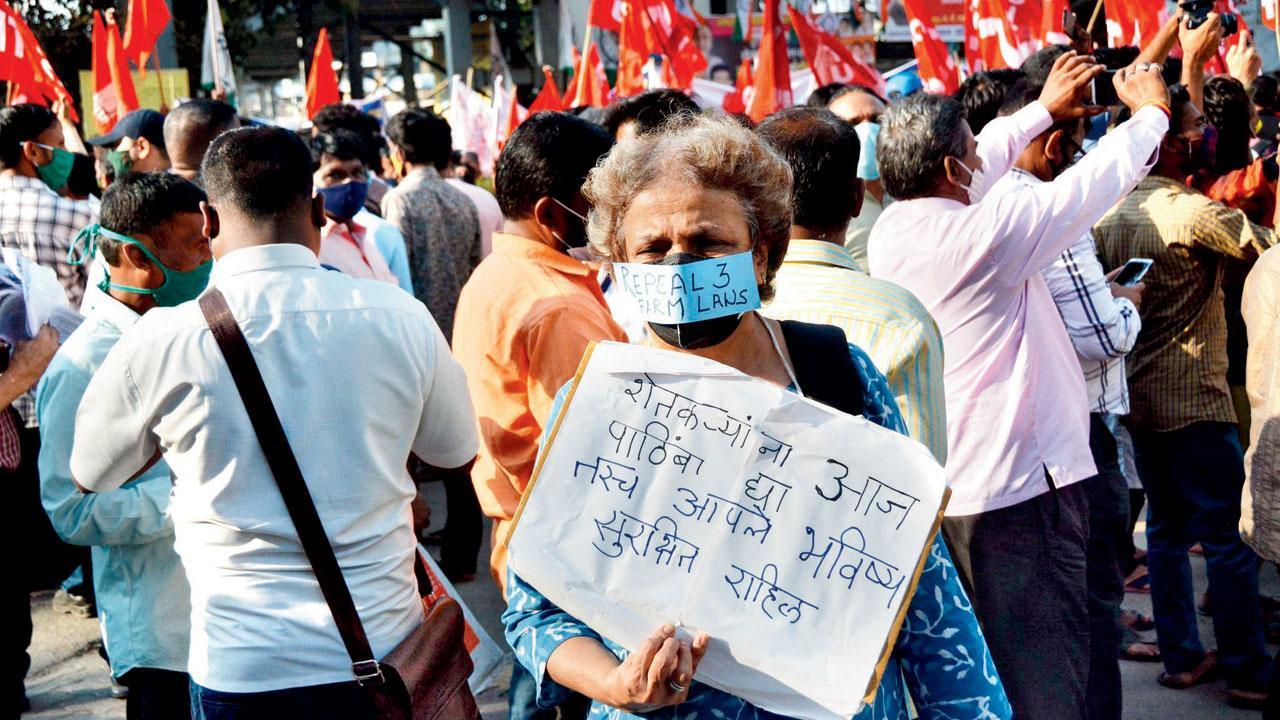At least two such gatherings of farmers are being planned, in Palghar and Nashik, to intensify the struggle against the Centre’s three farm laws

Protesters block roads as part of “Chakka Jaam” in protest against the three farm laws at Kurla East on Saturday. Pic/Sayyed Sameer Abedi
The All India Kisan Sabha (AIKS)—one of the largest pan-India farmer organisations that is also a part of the Samyukt Shetkari Morcha’s (SKM) struggle against the Centre’s three agricultural laws—will be holding at least two Kisan Mahapanchayats in Maharashtra, during the month of February, where thousands of farmers are expected to gather in a show of strength and demand a total repeal of the three laws.
ADVERTISEMENT
On Friday, thousands of protesting farmers gathered at Western UP’s Shamli district despite the state government having denied permission for the event as well as imposing Section 144. This gathering was called for by the Rashtriya Lok Dal (RLD) and was the fourth such Mahapanchayat in Western UP after Mathura, Baghpat and Muzaffarnagar. Now, it is the All India Kisan Sabha that will most likely give a national level call for such mahapanchayats to be held across the country, including Maharashtra.
Speaking with mid-day from the capital, where he is a part of the ongoing farmer’s agitation under the banner of the SKM, AIKS president Dr Ashok Dhawale said: “These mahapanchayats that are being held in Madhya Pradesh, UP and Rajasthan are creating a very bad situation for the BJP-led government at the Centre, because lakhs of farmers are travelling to and gathering here at these spots. This is going to be very tough for the central government to deal with. The Kisan Sabha is planning on organising such mahapanchayats all over the country…and we are trying for at least two such mahapanchayats in Maharashtra during February. One will most likely take place in Nashik, and the other in Palghar.”
Dhawale, who had also led the recent “vehicular march” of thousands of farmers from Nashik to Mumbai’s Azad Maidan, said: “We [need to] mobilise farmers in a big way, and gather support for them from the masses. The movement needs to maintain its impetus. Our gathering at Azad Maidan on the eve of Republic Day was a state-level event, but if Kisan Mahapanchayats are held—even in a small manner—across every district, it will increase the pressure on the central government tremendously and cause the sand to shift from below their feet.”
In the meanwhile, responding to the SKM’s national-level call for a nationwide chakka jam to be observed on February 6, the Samyukt Shetkari Kamgar Morcha (Maharashtra), which is an amalgamation of farmer organisations and citizens’ movement groups in the state, blocked the road near Kurla East railway station on Saturday evening. No buses or auto-rickshaws could make it to the station and commuters had to be dropped off on the main road and had to walk to the station from there. “This is a solidarity action taken by the workers and citizens of Mumbai to show that they too are in favour of the farmer’s struggle,” said Dhawale, adding that the workers who had gathered were also demanding a repeal of the four labour codes “which is a complimentary demand” to the repeal of the three farm laws.
However, while the rest of the country observed this chakka jam from 12 pm to 3 pm, the chakka jam at Kurla took place at 4.30 pm. Dhawale explained that in Mumbai, it’s not just the farmers that are agitating—but also the workers. “Many of them will be coming only after their first factory shift is over. We need to be flexible about the timing so that we can make the most of it.”
 Subscribe today by clicking the link and stay updated with the latest news!" Click here!
Subscribe today by clicking the link and stay updated with the latest news!" Click here!






